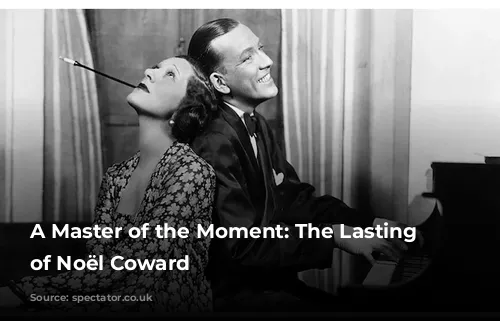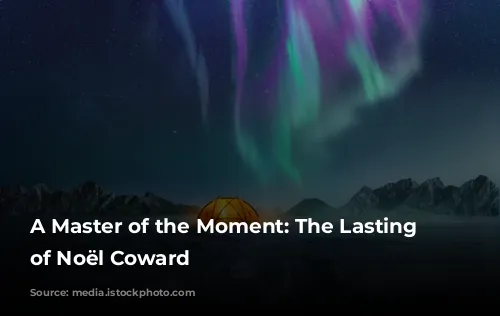Noël Coward, a name synonymous with wit and brilliance, was a master of the theatrical art. He possessed a unique ability to capture the essence of his time and weave it into captivating stories. While his work often reflected the fleeting trends of the day, some of his creations transcended their time, becoming timeless classics.

From the Stage to the Silver Screen: Coward’s Enduring Impact
Coward’s last stage appearance was in the 1969 film, “The Italian Job,” where he played the gangster Mr. Bridger. This role, like much of his work, had a captivating quality that stole the scene. His final act involved a dramatic descent down the prison stairs, greeted by the cheers of his fellow inmates. Coward’s career was marked by both worldly acclaim and a deep understanding of limitations, of doors that remained closed.
Many of Coward’s contemporaries believed that his focus on fleeting trends would ultimately lead to his downfall. However, time has proven them wrong. While most of his 50-odd plays have faded into obscurity, the best of them remain eternally brilliant. Works like “Blithe Spirit,” “Private Lives,” and “Hay Fever” are considered masterpieces, and others like “Design for Living,” “Present Laughter,” and “The Vortex” continue to find their place on stages today. His contributions to cinema with “In Which We Serve” and “Brief Encounter” are equally cherished, and his captivating songs continue to delight audiences. Coward’s impact was immediate and enduring. The witty dialogue in plays like “Waiting for Godot” and “Endgame,” and even in Harold Pinter’s works, owes much to the absurd exchanges in “Private Lives.” And the popular TV series, “Schitt’s Creek,” can be seen as a six-season exploration of the themes in “Hay Fever.”

A Genius of Innovation
Coward was an extraordinary innovator. Though “Hay Fever” fit perfectly within the English tradition of stage comedies, its execution was stunningly original. The curtain fall at the end of the first act, with the characters’ small talk failing and them staring at each other in disbelief, is a testament to his unique ability to create impactful moments. Coward continued to push boundaries even when trends turned against him. His 1947 play, “Peace in Our Time,” is credited by some as the first work of counterfactual literature, exploring the consequences of a German victory in World War II. He experimented with other unconventional formats, exploring different groups of people sharing the same space at different times, and delving into the lives of actors living together in a care home.

Unmasking the Man Behind the Mask: A Biographer’s Challenge
The challenge for any biographer of Noël Coward is to understand the man behind the public persona. Coward was a performer by nature, always “on” and entertaining others. Even his first letter, written at the age of eight, was a performance in itself. While glimpses of a more vulnerable side surfaced occasionally, for the most part, everything he presented to the world was carefully constructed.
The task of separating fact from fiction in Coward’s life is immense. There are countless anecdotes about his famous wit, some of which may be embellished. Soden, Coward’s latest biographer, expresses doubt about the veracity of some stories, including a supposed affair with the Duke of Kent and a famous joke about the Queen of Tonga’s lunch. While some of these stories may be exaggerated, the underlying truth is that Coward had a knack for turning every situation into an opportunity for entertainment.

Coward’s Unbreakable Spirit: A Life of Wit, Resilience, and Impact
Coward’s performing nature was both a source of strength and a barrier to truly knowing him. His unwavering ability to entertain, even in the face of adversity, allowed him to navigate challenging situations. He was the “pink and white/fastidious, almost girlish” type who remained resilient when others crumbled. Soden highlights Coward’s audaciousness in challenging the social norms of 1920s London, tackling taboo subjects with humor and shocking revelations. He often turned up uninvited but was always forgiven for his charming personality. Coward wasn’t a snob despite his friendships with royalty. He embraced intelligent individuals but poked fun at pretentiousness. His early career was boosted by a brilliant parody of the Sitwells, a renowned literary family, which cemented his reputation for wit and irreverence.
Coward’s determination and audacity led him to the heart of power during World War II. Through connections, he found himself in the company of Churchill and Roosevelt, even being invited to Roosevelt’s private chambers. He faced significant obstacles due to the prejudices of the time. Even prominent figures like Joyce Grenfell and Hugh Dalton expressed disdain for his sexuality, making it difficult for him to openly champion his cause.
Despite these obstacles, Coward dedicated himself to entertaining the troops during the war. He toured tirelessly, bringing laughter and joy to soldiers. “In Which We Serve,” his innovative film about the navy, is considered one of his most significant contributions. He also ventured into controversial territory, with songs like “Don’t Let’s Be Beastly to the Germans,” which received approval from Churchill himself.

A Touching Legacy
Soden’s biography is a touching tribute to Coward. The author cleverly incorporates Coward’s style into the narrative, making for an engaging and intimate read. The conclusion is particularly effective, allowing Coward’s story to fade like the ghost of Elvira in “Blithe Spirit,” and then providing a detailed account of his final days through the voices of biographers, friends, and servants.
Soden’s work is a testament to Coward’s enduring legacy. His legacy lives on through his iconic plays, captivating songs, and timeless humor. While some of his work may have been ephemeral, others have left an indelible mark on the world of theater and entertainment. Coward’s life is a reminder that even in the face of obstacles, it’s always worth taking a chance. He showed us that laughter can be a powerful force, and that wit can be a weapon against prejudice. His legacy reminds us to embrace our uniqueness, to never take ourselves too seriously, and to find joy in every moment.









